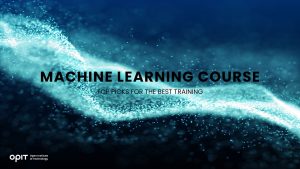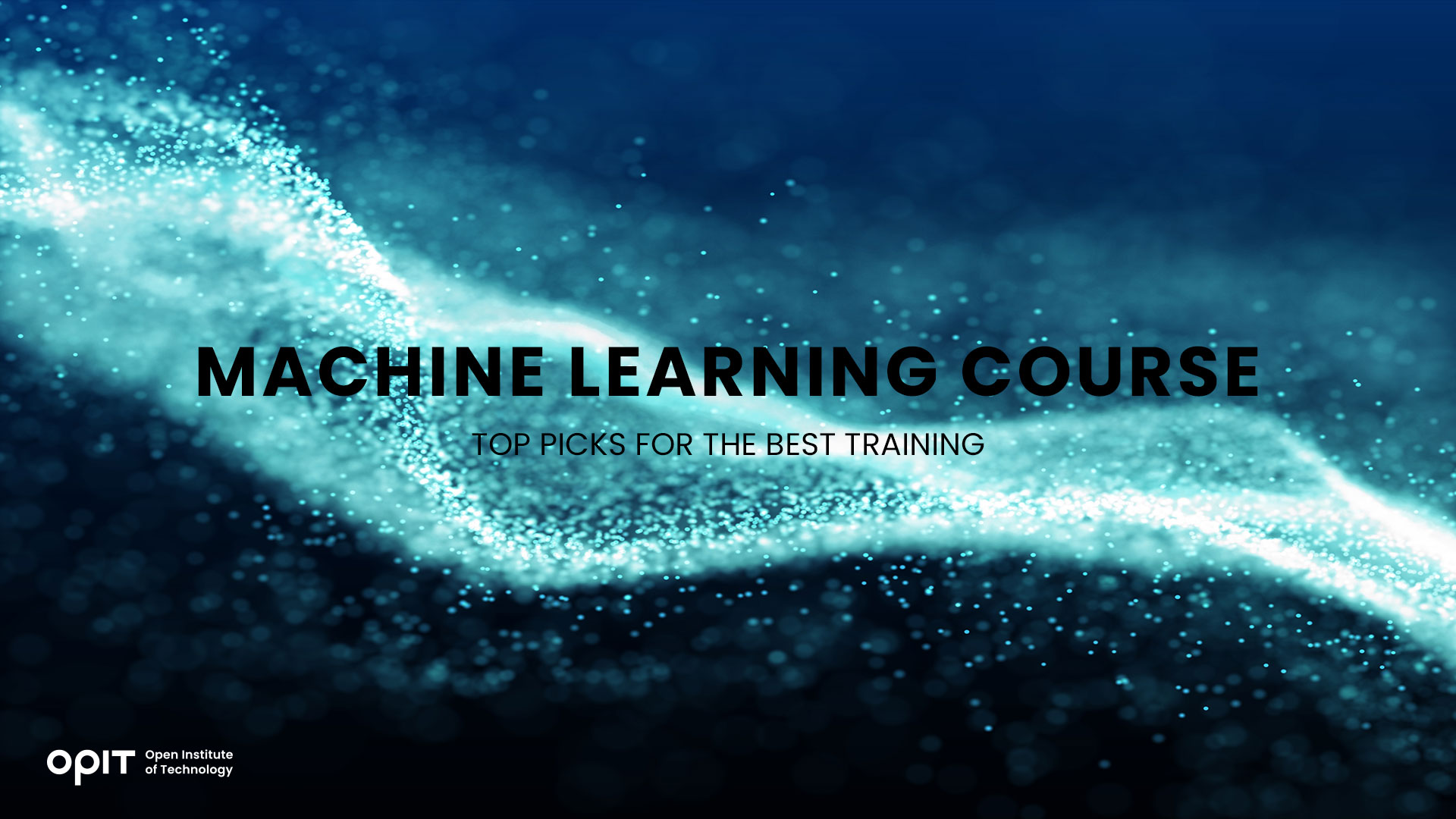

Data permeates almost every aspect of our lives. Trying to make sense of it all is a Herculean endeavor that would take humans years (if not centuries). But fear not; it’s machine learning to the rescue.
Machine learning algorithms can comb through data in a matter of days or even hours, uncovering valuable insights. Many industries have already experienced numerous benefits of these algorithms, yet the field promises to get even bigger and better.
However, we shouldn’t discard humans just yet. They still play an essential role in this process.
Machine learning algorithms couldn’t parse and interpret data correctly without human guidance. As the machine learning field grows, so will the need for skilled data scientists.
One way to acquire the skills necessary to participate in this game-changing field is by taking a machine learning course. When chosen wisely, this course will provide you with crucial theory and invaluable practice to enter the field with a bang or take your knowledge to the next level.
To ensure you choose the best machine learning course, we’ve compiled a list of our top five online picks.
Factors to Consider When Choosing a Machine Learning Course
Just like data, there are tons of courses online. Taking all of them would not be humanly possible. And frankly, not all of these courses would be worth your time. Remember these factors when browsing online learning platforms, and you’ll pick the best machine learning course each time.
Course Content and Curriculum
Shakespeare once said, “Expectation is the root of all heartache.” Believe it or not, this quote will benefit you immensely when choosing an online machine learning course.
Just because a course is named Machine Learning, it doesn’t mean it will be helpful to you. The only way to ensure the course is worth taking is to check its curriculum. Provided the description isn’t misleading, you’ll immediately know whether the course suits your educational and professional needs.
Instructor’s Expertise and Experience
Who teaches the course is as important as what is taught (if not more). Otherwise, you could just pick up a book on machine learning with the same content and try to make sense of it.
So, when a machine learning course piques your interest, check out the instructor.
Are they considered an authority in machine learning? Are they industry veterans?
A quick Google search will tell you all you need to know.
Course Duration and Flexibility
“Can I fully commit to this course?” That is the question to ask yourself before starting a machine learning course.
One look at the course’s description will tell you whether it takes an hour or months to complete. Also, you’ll immediately know if it is self-paced or fixed-timeline.
Hands-On Projects and Real-World Applications
No one can deny the value of theoretical knowledge in a machine learning course. There’s no moving on without understanding machine learning algorithms and underlying principles.
But how will you learn to use those theoretical concepts in practice? That’s right, through hands-on projects and case studies.
Ideally, your chosen course will strike the perfect balance between the two.
Course Reviews and Ratings
Sure, it’s easy to manipulate reviews and ratings. But it’s even easier to spot the fake ones. So, give the rating page a quick read-through, and you should be able to tell if the course is any good.
Certification and Accreditation
Certified and accredited courses are a must for those serious about a career in machine learning. Of course, these courses are rarely free. But if they help you land your dream job, the investment will be well worth it.
Top Picks for the Best Machine Learning Courses
We’ve also considered the above-mentioned factors when choosing our top picks for online machine learning courses. Without further ado, check out the best ones to help you learn or improve machine learning skills.
Supervised Machine Learning: Regression and Classification
This course has a lot of things going for it. It was one of the courses that popularized the entire concept of massive open online courses. And it is taught by none other than Andrew Ng, a pioneer and a visionary leader in machine learning and artificial intelligence (AI). In other words, this course is the gold standard by which every machine learning course is evaluated.
Here are all the important details at a glance:
- The course is beginner-friendly and features flexible deadlines.
- It lasts 11 weeks, each covering different machine learning techniques and models (six hours per week).
- It covers the fundamentals of machine learning and teaches you how to apply them.
- The skills you will gain include regularization to avoid overfitting, gradient descent, supervised learning, and linear regression.
- You’ll earn a certificate after completing the course.
The only thing to note about the certificate is that you must sign up for a Coursera membership ($39/€36 a month) to receive it. Otherwise, you can audit the course for free. To apply, you only need to create a Coursera account and press the “Enroll” button.
Machine Learning With Python
Another fan-favorite on Coursera, this machine learning course uses Python (SciPy and scikit-learn libraries). It’s offered by IBM, a company at the forefront of machine learning and AI research.
Here’s what you need to know about this course:
- The course is beginner-friendly but requires a great deal of calculus knowledge.
- It’s divided into four weeks, each dedicated to one broad machine learning task (regression, clustering, classification, and their implementation).
- By the end of the course, you’ll learn the theoretical fundamentals and numerous real-world applications of machine learning.
- The emphasis is placed on hands-on learning.
- A certificate is available, provided you apply for a Coursera membership ($39/€36 a month).
A Coursera account is all you need to apply for this course. You can start with a 7-day free trial. You’ll have to pay $39 (approximately €36) a month to continue learning.
Machine Learning Crash Course
Google’s Machine Learning Crash Course is ideal for those who want a fast-paced approach to learning machine learning. This intensive course uses TensorFlow, Google’s popular open-source machine learning framework.
Check out these facts to determine whether this is the best machine learning course for you:
- You can take this course as a beginner if you read some additional resources before starting.
- The course consists of 25 lessons that you can complete in 15 hours.
- Google researchers present the lessons.
- It perfectly combines theoretical video lectures (machine learning concepts and engineering), real-world case studies, and hands-on exercises.
- No certificate is issued upon completion.
Enrolling in this course is pretty straightforward – just click the “Start Crash Course” button. The course is free of charge.
Machine Learning A-Z: Hands-On Python & R in Data Science
As its name implies, this Udemy course is pretty comprehensive. Two data scientists teach it, primarily focusing on practical experiences (learning to create machine learning algorithms). If you feel like you’re missing hands-on experience in machine learning, this is the course for you.
Before applying, consider the following information:
- The course can be beginner-friendly, provided you have solid mathematics knowledge.
- It consists of video lessons and practical exercises (around 40 hours total).
- The introductory portion focuses on regression, classification, and clustering models.
- You’ll receive a certificate of completion.
To gain lifetime access to this course, you’ll need to pay $89.99 (a little over €83). Applying for it is a matter of creating an Udemy account and purchasing the course.
Machine Learning Specialization
This advanced course is the course you want to take when mastering your knowledge of machine learning. Or perhaps we should say courses since this specialization consists of six separate courses. The program was created by Andrew Ng, who also serves as an instructor (one of four total).
Here’s a quick overview of the course’s key features:
- The course isn’t beginner-friendly; it’s intermediate level and requires previous experience.
- At a pace of three hours per week, it takes approximately seven months to complete.
- The course focuses on numerous practical skills, including Python programming, linear regression, and decision trees.
- Each course includes a hands-on project.
- You’re awarded a shareable certificate upon completion of each course in the specialization.
To begin this challenging yet rewarding journey, create a Coursera account and enroll in the specialization. Then, you can choose the first course—the entire specialization costs around $350 (close to €324).
Additional Resources for Learning Machine Learning
The more you immerse yourself in machine learning, the faster you advance. So, besides attending a machine learning course, consider exploring additional learning resources, such as:
- Books and e-books. Books on machine learning provide in-depth explanations of the topic. So, if you feel that a course’s content is insufficient, this is the path for you. Check out “Introduction to Statistical Learning” (theory-focused) and “Hands-On Machine Learning With Scikit-Learn and TensorFlow.”
- Online tutorials and blogs. Due to the complexity of the field, only a few bloggers post consistently on the topic. Still, blogs like Christopher Olah and Machine Learning Mastery are updated relatively frequently and contain plenty of fascinating information.
- Podcasts and YouTube channels. Keep up with the latest news in machine learning with podcasts like “This Week in Machine Learning and AI.” YouTube channels like Stanford Online also offer a treasure trove of valuable information on the topic.
- Networking and community involvement. You can learn much about machine learning by sharing insights and ideas with like-minded individuals. Connect with the machine learning community through courses or conferences (AI & Big Data Expo World Series, MLconf).
Master Machine Learning to Transform Your Future
An online machine learning course allows you to learn directly from the best of the best, whether individuals like Andrew Ng or prominent organizations like Google and IBM. Once you start this exciting journey, you probably won’t want to stop. And considering all the career prospects machine learning can bring, why would you?
If you see a future in computer science, consider pursuing a degree from the Open Institute of Technology. Besides machine learning, you’ll acquire all the necessary skills to succeed in this ever-evolving and lucrative field.
Related posts

Source:
- EFMD Global, Published on July 12th, 2024.
By Stephanie Mullins
Many people love to read the stories of successful business school graduates to see what they’ve achieved using the lessons, insights and connections from the programmes they’ve studied. We speak to one alumnus, Riccardo Ocleppo, who studied at top business schools including London Business School (LBS) and INSEAD, about the education institution called OPIT which he created after business school.
Please introduce yourself and your career to date.
I am the founder of OPIT — Open Institute of Technology, a fully accredited Higher Education Institution (HEI) under the European Qualification Framework (EQF) by the MFHEA Authority. OPIT also partners with WES (World Education Services), a trusted non-profit providing verified education credential assessments (ECA) in the US and Canada for foreign degrees and certificates.
Prior to founding OPIT, I established Docsity, a global community boasting 15 million registered university students worldwide and partnerships with over 250 Universities and Business Schools. My academic background includes an MSc in Electronics from Politecnico di Torino and an MSc in Management from London Business School.
Why did you decide to create OPIT Open Institute of Technology?
Higher education has a profound impact on people’s futures. Through quality higher education, people can aspire to a better and more fulfilling future.
The mission behind OPIT is to democratise access to high-quality higher education in the fields that will be in high demand in the coming decades: Computer Science, Artificial Intelligence, Data Science, Cybersecurity, and Digital Innovation.
Since launching my first company in the education field, I’ve engaged with countless students, partnered with hundreds of universities, and collaborated with professors and companies. Through these interactions, I’ve observed a gap between traditional university curricula and the skills demanded by today’s job market, particularly in Computer Science and Technology.
I founded OPIT to bridge this gap by modernising education, making it affordable, and enhancing the digital learning experience. By collaborating with international professors and forging solid relationships with global companies, we are creating a dynamic online community and developing high-quality digital learning content. This approach ensures our students benefit from a flexible, cutting-edge, and stress-free learning environment.
Why do you think an education in tech is relevant in today’s business landscape?

As depicted by the World Economic Forum’s “Future of Jobs 2023” report, the demand for skilled tech professionals remains (and will remain) robust across industries, driven by the critical role of advanced technologies in business success.
Today’s companies require individuals who can innovate and execute complex solutions. A degree in fields like computer science, cybersecurity, data science, digital business or AI equips graduates with essential skills to thrive in this dynamic industry.
According to the International Monetary Fund (IMF), the global tech talent shortage will exceed 85 million workers by 2030. The Korn Ferry Institute warns that this gap could result in hundreds of billions in lost revenue across the US, Europe, and Asia.
To address this challenge, OPIT aims to democratise access to technology education. Our competency-based and applied approach, coupled with a flexible online learning experience, empowers students to progress at their own pace, demonstrating their skills as they advance.
Read the full article below:

Source:
- The European, Summer 2024 Edition, Page 24
With careful planning, ethical considerations, and ensuring human oversight is maintained, AI can have huge market research benefits, says Lorenzo Livi of the Open Institute of Technology.
By Lorenzo Livi
To market well, you need to get something interesting in front of those who are interested. That takes a lot of thinking, a lot of work, and a whole bunch of research. But what if the bulk of that thinking, work and research could be done for you? What would that mean for marketing as an industry, and market research specifically?
With the recent explosion of AI onto the world stage, big changes are coming in the marketing industry. But will AI be able to do market research as successfully? Simply, the answer is yes. A big, fat, resounding yes. In fact, AI has the potential to revolutionise market research.
Ensuring that people have a clear understanding of what exactly AI is is crucial, given its seismic effect on our world. Common questions that even occur amongst people at the forefront of marketing, such as, “Who invented AI?” or, “Where is the main AI system located?” highlight a widespread misunderstanding about the nature of AI.
As for the notion of a central “main thing” running AI, it’s essential to clarify that AI systems exist in various forms and locations. AI algorithms and models can run on individual computers, servers, or even specialized hardware designed for AI processing, commonly referred to as AI chips. These systems can be distributed across multiple locations, including data centres, cloud platforms, and edge devices. They can also be used anywhere, so long as you have a compatible device and an internet connection.
While the concept of AI may seem abstract or mysterious to some, it’s important to approach it with a clear understanding of its principles and applications. By promoting education and awareness about AI, we can dispel misconceptions and facilitate meaningful conversations about its role in society.
Read the full article below:
- The European, Pages 24 to 26.
Have questions?
Visit our FAQ page or get in touch with us!
Write us at +39 335 576 0263
Get in touch at hello@opit.com
Talk to one of our Study Advisors
We are international
We can speak in:


